Check List for Island Buyers
Our Emphasis is on Habitable Private Islands!
Since 1971, over 2,650 sold and several 44,000 island beds rented.
In excess of 12,000 island files in our archive.
As we are constantly in contact with island owners,
we know the difference between habitable private islands and remote private islands!
This check list is to be taken very seriously. It applies to all islands.
However, paradise can never be found on earth and we always have to live with some compromises.
Therefore, the checklist is to be considered as a guideline to evaluate private islands and its purpose is for the buyer to determine with which combination of pros and cons he can live best.
How do we value the islands we list to insure that they have a quality standard?
We give each of the 12 checkpoints on the list 2 points - altogether 24 points. If the islands, which we list, reach 66% of the maximum amount of points, then we accept the listing and can consider the island as habitable. This is only a guideline to make sure that every buyer knows what he/she is buying. Islands which do not even reach 33% will not be listed on our website at all.
Download: Island buyers' checklist - Postcard Format (1,96 MB)
Check List for Island Buyers – 12 vital criteria
Title
Only unencumbered freehold title is acceptable
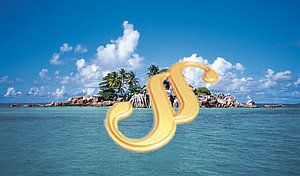
There are a few criteria where one cannot accept compromises - one is the title. As an island buyer, you should insist to receive an unencumbered freehold title for the entire island against the purchase price. In a few cases, a small property to a third party might be acceptable - for example, the government may own a lighthouse on an island.
Freehold means that you own the property 100%.
Leasehold means that somebody else owns the property and you only have the right to use the island for, in some cases, specific purposes. A leasehold island has the following disadvantages:
You do not own the island.
You can only use the island for a specific time - meaning that the longer you own the island, the less the developments, for which you have paid, are worth. If the lease is for a specific use and you wish to change the use, you may lose your rights to the island.
Most importantly: You cannot insure your island against expropriation, as you do not own the island. Should an expropriation take place, you will not be compensated for the land. Expropriations are seldom but they do take place if properties and/or islands are declared to be either parks or used for strategic purposes for example.
In many cases, leasehold islands are being offered for freehold prices. Of course, this is ridiculous. A leasehold island is, on average (depending on its developments), only worth 20% of the freehold island.
To make sure that the island has a good unencumbered freehold title, a solicitor, whom you employ from the area where the island is located, will be of assistance. Make sure that the freehold title is also recorded in a public registry (seek solicitors advice). The solicitor will advise you on the following matters:
- Title - tenure, whether it is unencumbered
- Building permit available or building permit issued for existing houses
- Environmental laws effecting the island or the area
Also, before you purchase an island, we recommend that you speak to a chartered accountant residing in the host country, to see what tax consequences you would have to face - for example:
- Deed Transfer Tax or Purchase Tax, Stamp Duty
- Obligation of Purchaser should the Vendor fail to pay his/her taxes on profits realised
- Wealth tax, inheritance tax, gift tax
- What kind of income tax you would have to face in the case of a resale
For a proper due diligence, you should also speak to an engineer/architect in respect of the quality of the existing buildings and also regarding which laws apply if you build a wharf.
To find a solicitor, we suggest that you do not obtain the contact necessarily from the Vendor and also not from the agent. You should find a solicitor independently - perhaps through your local embassy. In certain countries, independent advice is extremely important.
We have gained a lot of experience and are more than happy to share this with you. If you have any questions, please do not hesitate to call us.
Medical
Medical services must be within a 90 minute radius of the island
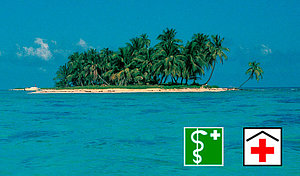
This is often a very underestimated point. In the last 25 years, we have seen many incidents on islands, where the availability of medical services was vital. Many clients believe that they are healthy and that nothing bad can happen. However, accidents may occur such as a heart-attack or even a falling coconut! Whatever it is, it can effect the owner, his/her family, friends or employees (in certain circumstances, the owner may be liable).
Personally, I would never buy an island unless it is possible to be transported from the island to a hospital within one hour. We could stretch this to possibly 90 minutes but that should be the very maximum. You should not consider buying an island if you cannot get to a hospital, clinic or medical service station within a maximum of 90 minutes. Even if you do take the risk of purchasing a remote island, if you decide to sell the island, the new buyer may be more considerate as far as the proximity of medical services is concerned and may decide against the purchase of the island. These islands are then worth less.
The 90 minutes requirement can be fulfilled easily - especially if emergency helicopters can access the island in that area.
This point is one of the reasons why so many islands are left undeveloped in certain countries and areas. Very likely, they will never be developed. Most islands, where medical services are nearby, are developed and have accordingly high values.
In the entire island world, this is, in the end, the most crucial point. Unfortunately, some island owners have lost their lives, as they did not consider the importance of the availability of medical services nearby.
As only islands, where medical services are close by, are considered by users, these islands are good investments.
Please note that the requirement of medical services nearby may not apply to resort and hotel islands, as these islands often have first-aid staff and clinic-room on the island. They are often well prepared for emergency situations.
Fauna
Can you live with indigenous animals on the choosen island (some have mosquitoes, sand-flies …)
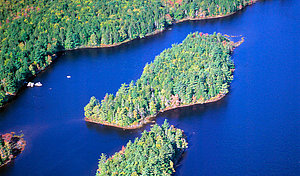
This chapter is not as critical as medical services. Fauna and flora are all part of nature. This chapter should remind the island buyer to determine whether he/she can live with what is on the island. It has just happened, that a few of our clients underestimated the amount or the consequences of mosquitoes and sand-flies. In some areas, mosquitoes need to be sprayed with chemicals. Some people are even allergic to the chemical spray. The same problem exists with sand-flies. Some people are immune - others are allergic.
For example, on many Australian islands are snakes (tiger tasman snakes). However, the islands are considered to be habitable, as very very few incidents have been reported (on average four per annum in the entire country). If a hospital can be reached within 24 hours, a snake bite can be treated - so we understand. Still, island buyers should be aware of this.
In the northern hemisphere, many cormorants can be found. They are not directly a danger to human beings, however they can effect trees and plants. If they are left undisturbed on an island for years, the trees slowly disappear.
These are just some examples to alert island buyers to inspect the island, as mosquitoes, sand-flies, etc. are not visible on photos.
It is not that we say that these islands are negative. Nature is pure and healthy. The question is, can you live with it?
Flora
Get familiar with trees and plants, pros and cons
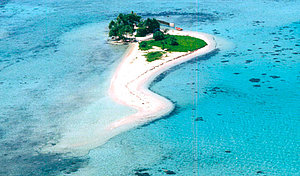
As with fauna, also flora is part of mother nature and cannot be criticised.
Again, this is to alert clients to inspect the island carefully to see whether they can live with what is there and to study what grows on the island.
In certain areas, there are poisonous plants. Some plants can cause allergic reactions. There are coconut trees on many tropical islands. There is also a danger that a coconut falls on your head if the coconut trees are not maintained. If there is no maintenance on the island, perhaps you should think twice whether the island could be potentially dangerous or not.
Studying flora carefully also gives you an idea of what kind of ground water is on the island. Experts can read from the vegetation how much ground water is available. Also, you can learn from the vegetation whether the island is self-sufficient.
As a summary: the study of the flora on the island is a worthwhile and useful point on the checklist.
Host Country
Social environment, acceptance of foreign investment
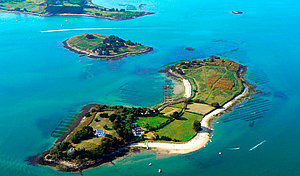
If a foreigner invests in a foreign country, the investor will be confronted by one of three possible different legal systems:
1. Free Market
Foreign investments can be made in the country without any restrictions. One can sell and buy as much as one wishes. This applies to the United States, for example or Canada, Germany, France and Great Britain to name a few. Where a free market exists, little concern about reselling will exist but the investor should familiarise himself/herself wide the tax issues and a chartered account should be consulted in respect of deed transfer tax, stamp duty, inheritance tax, gift tax and if the island is sold at a profit, what the tax is on realised gain.
2. Restricted Market
The host country allows a foreigner to purchase but only with a government sanction. In many countries, where government sanctions are necessary, governments check the character of the buyer as well as his/her intentions with the property in question. In many cases, where intentions have speculative character, the purchase will be disallowed. Where jobs are created, purchasers are welcome. It is very important to be extremely careful when applying for a sanction. Every word on the application should be true and reflect the true intentions of the buyer, as otherwise the buyer is exposed to troubles, if not expropriation or forced sale.
Furthermore, the investor should realise that there are two groups of countries with a restricted market. Countries such as for example Switzerland, New Zealand, Australia to name only a few, have their own local market. This means that at one point, when the foreign investor wishes to resell, he/she can at least rely on a local market within which he/she will be able to sell the island. In such cases, the island owner can always expect to receive market prices for the property. There are other countries such as the Tahiti, Grenada, Seychelles, where a government permit is necessary. However if the permit is denied, the only option which the Vendor has is to sell to the local market. In those cases, the buying power may not be so strong.
To find out for which countries a permit is required, it is advisable to call the relevant embassies in your own country, who should be in a position to provide such information.
3. Foreigners are not allowed to purchase
In these countries, such as the Philippines, Indonesia, Malaysia and other countries in the Pacific Ocean to name a few, foreigners are not permitted to purchase freehold islands/land. Many websites and Vendors try to convince buyers to form companies or use trust bodies in order to sell their properties. In the end, they circumvent the law which we cannot recommend. In such countries, people are better off to rent an island for their holidays and simply wait for the government policy to change in their favour before making an acquisition.
The legal requirements as above is one issue. There is also the issue of the welcome of foreign investments in a country. Again, should you rent an island in the country of your choice, you will be able to determine the reaction of the locals to foreign investments. On our extensive travels, we have only seen very very few areas, where foreigners are met with are met with reservation. In the majority of cases, it is not an issue, if the foreigner is able and willing to blend into the society. However the extent of how a foreigner is welcome should be considered - the best way is to rent an island, as an unfriendly situation can be made apparent very quickly.
Some local people are right to be concerned, if foreigners subdivide the island or use the island as a speculation object. We would just like to alert the buyer to take careful steps and be concerned.
Access
Is the island accessible? Harbour, anchorage, landing …
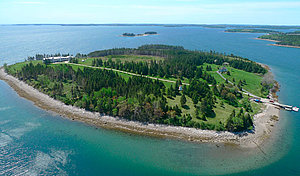
Reaching the island in all seasons and weather conditions are as important as being able to leave the island. Check out whether the island has natural anchorage, a small protected bay where a boat can be moored without being in danger of drifting away - preferably in an area where a walkway from the bay to the house can be built. Islands in rough seas where no anchorage is possible (only a few days per year) should definitely not be considered. Otherwise, problems and accidents are inevitable. On certain flat islands, an airstrip can be built. This is very advantageous but the airstrip must also be maintained by a caretaker.
In addition to the island, a mainland property can be very convenient. It can be used to park a car, moor a boat or a location to build a garage to be used as a storage facility for the island. It is extremely helpful for the entire island logistics. The mainland property should ideally be in viewing distance from the island. In some cases, island owners have even built a small cottage on their mainland property - particularly handy when rough waters force the owner to stay on the mainland.
Before buying an island, check out whether that particular island offers such opportunities.
Infrastructure
Water, sewage, electricity, telephone, internet
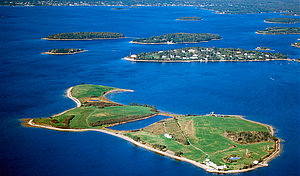
Fresh water, a legal sewage system and availability of electricity, telephone and internet all belong to civilised island life.
One could perhaps spare electricity, telephone and internet but not water! If there is no water on the island and the ground water table has sunk so deep that it cannot serve the plants, the island dries out and becomes unappealing. The only way to get water would be using a desalination system (costs up to US $50,000). Ideal is a drilled well, which almost all islands in the northern hemisphere and in the very southern hemisphere offer. When considering the purchase of an island around the equator, the availability of water needs to be on your checklist. Islands with an own water supply are automatically in a much more valuable category.
Electricity can be generated today by using alternative methods. Still, the ideal situation would be to run underwater cables from the mainland to the island. The initial costs are high but as time progresses, this is a much more comfortable option. At the same time, a telephone line can be installed, however with today's cellular network, this is no longer a big issue.
Building Permit
Availability of permit, size of house, type of development
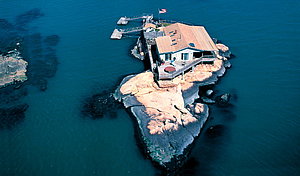
There are developed and undeveloped islands.
The developed islands have existing homes. The Purchaser must ask himself/herself whether these homes were built legally and if a building permit is available to view. It is also important to know whether extensions or additions to the existing buildings are permitted by the planning officers.
Undeveloped islands have more severe problems. Here, one must find out whether a permit is at all available. Also, this point should not be underestimated. We strongly advise to hire professionals, architects, surveyors for assistance. We recommend always to take an island "under contract" with a 90 day due diligence period. Within that time, you can find out whether building permits are available. If so, you then reconfirm the transaction after 90 days. If not, you receive your deposit back and declare the agreement as null and void. We are sure that your solicitor can advise you on this point. Islands without building permits are literally worthless.
The more environmental laws are introduced, the more difficult it is to get a building permit.
Climate
Get familiar with the weather and climate conditions
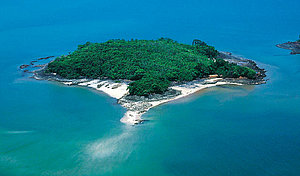
If you have made up your mind which island you wish to buy, check the weather! On the world wide web, there are many websites with weather statistics for every country (such as www.weather.com etc.).
One can see the weather statistics including wind, amount of hours of sunshine throughout the year and humidity. If you like what you see, you should invest in that area. If you inspect the island, it is very advisable to do so during the worst month (weather-wise), so that in future, you will not be disappointed.
Climate conditions are also important for investors. Only islands which have moderate climates enjoy the best growth in value. With increasingly severe weather conditions such as tornadoes, hurricanes and tsunamis, this checkpoint should be looked at very carefully.
Island Surroundings
Neighbourhood, amenities, services and also crime level
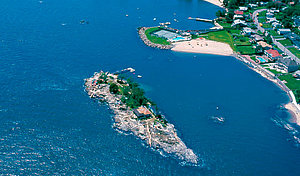
When people imagine life on an island, they usually picture solitude and being alone. However, in the real world, this is different. An island owner will have neighbours and will need to get by boat to a point at the mainland. The owner will need to buy fuel and food, visit repair stations, postal service, pharmacy, doctor, etc. If you want to obtain a building permit or a permit to build a wharf, obtain quotes from electricity companies, telephone, etc., you are part of the community.
Ideally, you must blend into this social environment. Therefore, the rental of an island in the immediate area is highly recommended. Renting an island for a week or two will answer many questions.
We try to concentrate on safe areas but almost daily, we are asked by interested parties whether we can report any piracy/crime incidents in that area. In almost all cases, island are very safe.
However, certain incidents involving crime have taken place, especially in areas where drug trafficking is rife. Of course, in such areas, special care must be taken. Normally, island owners do not furnish their homes with very expensive items, so they do not become targets for any unwelcome visitors. A thief certainly would reconsider the risk of becoming a prisoner on the island. It is probably "safer" for a thief to concentrate on a mainland property. Again, by renting an island in the area, the neighbours and locals will be able to provide you with a deeper insight to that specific area.
"Rent before you buy"
Island Value (investment)
Island market: locally-driven and/or by foreigners

Each purchase is an investment, regardless if the island is used for holiday purposes or not. Everybody wants to have the opportunity to be able to sell their island at a later date, therefore the prerequisites of the island market needs to be understood.
There are two aspects of the island market:
(1) An island market which is only locally driven:
In this case, the island buyers are mainly locals - either because of the applicable laws controlling foreign investments or because of climate and other circumstances. In those cases, one needs to know that even if a foreigner buys an island and wants to sell it at a later date, the demand may be very limited and the buying power may only come from local hands. Because of this, it is detrimental to investments to buy at prices only foreigners can afford.
We have seen countries, where islands could be bought for US $50,000 to US $100,000 among locals and then offered on the international market for US $4,000,000 or US $5,000,000. These advertisements can be seen everywhere. Needless to say, the seller will not find a buyer.
(2) There are also island markets, which are only foreign driven:
Here, foreigners are allowed to buy with/without a permit in an area of moderate climate, etc. However, where locals are not wealthy enough, only foreigners are able to determine the values and prices of property. The risk here is, that at some time, there may be laws restricting the purchase by foreigners and the island owners will not be able to even get back what they paid for the property. In such cases, only a local can buy. In the past thirty years, we have seen this repeat itself all over again and are surprised how oblivious some investors can be.
(3) Then there is the open and free market, such as in Western Europe and North America, where both locals and foreigners purchase islands:
In the past 30 - 40 years, there has been no drastic changes in any laws. This is the best basis for a reliable investment with best growth potential.
So we advise island buyers to look around and see how well the islands are accepted in the immediate neighbourhood. There are areas, where each rock jutting out of the ocean has been developed with a home, indicating a high demand. There are also areas on this globe, where islands are left untouched for decades- also this has its reasons.
As with all commodities, smart purchasers have a checklist, to which they should adhere. An island purchase is as fragile as flying a plane.
Island Seller
Notes on dealing with owner directly, licensed agents or third party

This is not so much a real checkpoint but simply a point to note.
If you deal with the owner, you should make sure that you do your due diligence and consult a totally independent legal advisor. Your solicitor will then escort you through the closing.
If you deal with an agent, make sure that the agent has a real estate licence in the area where the island is located.
If the agent works on an international level, he/she should be associated with a local agent in the area where the island is located. Both the owner and licensed agent are both obliged to represent the island specifications and details in a true manner. This representation should not just be the photos and headlines on the website but also in the real official offering memorandum.
If you decide to deal with third parties, you will have to find out whether these third parties have an obligation to a certain extent. If not, you should place more emphasis on your own due diligence.
To find out who is registered as a local or international agent, check with the international real estate association FIABCI www.fiabci.com
Your local embassy will provide you with a list of solicitors in the area where you wish to buy. You may also speak to the real estate board of the country in question.
